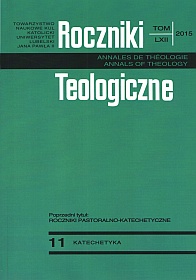Spiritual Formation of Lay Catechists in a Secularized
Abstract
In His salutary work God uses people whom we usually call catechists. They are the pupils who follow the Gospel and explain its contents to others. To be able to teach the rules of the new life they themselves have to be subjected to spiritual formation that is a process tending to shape a mature, ancillary and dialogic personality. Postconciliar documents on catechesis especially emphasize the role of lay people in the catechetic process. The present situation of the world, in which the formation of catechists has to take place, is characterized by temporariness, uncertainty of the future, which causes numerous difficulties in its adequate realization. The starting moment for the proper catechetic formation of lay catechists is the family environment, and then it is systematic catechization and the potential contained in religious movements and apostolic groups. A well formed catechist should be characterized by an ancillary attitude and he should represent an attitude that is open to a man’s problems. A catechist's mature personality is expressed by a practical synthesis of his life and service. It is always based on his personal prayer, teacher’s love, participation in the Eucharist, practicing Marian piety and a dynamism taken from following St Paul the Apostle, as the first model of efficient catechists.
References
Aparecida. V Ogólna Konferencja Episkopatów Ameryki Łacińskiej i Karaibów. Dokument końcowy. Jesteśmy uczniami i misjonarzami Jezusa Chrystusa, aby nasze narody miały w Nim życie. Tłum. K. Zabawa, K. Łukaszczyk. Gubin 2014.
Bankowicz M., Bonhoeffer D.: Być chrześcijaninem znaczy być człowiekiem. „Chrześcijanin w Świecie” 175-176:1988 nr 20 s. 135-146.
Benedykt XVI: Przemówienie podczas spotkania z duchowieństwem diecezji rzymskiej w Bazylice św. Jana na Lateranie (13 maja 2005). OsRom 7-8:2008 s. 11.
Benedykt XVI: Przekazywanie wiary nowym pokoleniom jest odpowiedzią na kryzys wychowawczy. Przemówienie do Zgromadzenia Ogólnego Konferencji Episkopatu Włoch (29.05. 2008). OsRom 305:2008 nr 7-8 s. 12-14.
Dziewulak D.: Systemy szkolne Unii Europejskiej. Warszawa 1997.
Jan Paweł II: Dar i Tajemnica. Kraków 1996.
Jan Paweł II: List do kapłanów na Wielki Czwartek (13 04.1987) nr 10. AAS 79:1987 nr 1292.
Kongregacja ds. Duchowieństwa. Dyrektorium o posłudze i życiu kapłanów (31.01.1994). Wyd. polskie. Poznań 2003.
Kulpaczyński S.: Formacja katechetów. EK. T. 5. Lublin 1989 kol. 389-390.
Lobkowicz M.: Quo vadis Mater Ecclesia? „Znak” 10:2001 s. 28-40.
Łabendowicz S.: Formacja katechetów. Lublin−Radom 1994.
Majewski M.: Katecheza permanentna. Kraków 1989.
Majewski M.: Katecheza wierna Bogu i człowiekowi. Kraków 1986.
Materski E.: Odpowiedzialność Kościoła za katechezę. Radom 1993.
Ratzinger J.: Skandalöser Realismus? Gott handelt in der Geschichte. Bad Tölz 2005.
Stafin R. Kościele wypłyń na głębię. Refleksje duszpasterskie o Kościele w Europie na przykładzie Niemiec i Polski. Tarnów 2007.
Wrońska H. Katecheza a małe grupy szkolne i parafialne. Lublin 2007.
Zając M. Katechetyka w procesie kształcenia kaznodziejów. W: Integralne kształcenie kaznodziei. Red. W. Broński. Lublin 2006 s. 285-296.
Zając M. Katecheza maryjna w Polsce w latach 1905-2005. Lublin 2006.
Copyright (c) 2015 Roczniki Teologiczne

This work is licensed under a Creative Commons Attribution-NonCommercial-NoDerivatives 4.0 International License.





